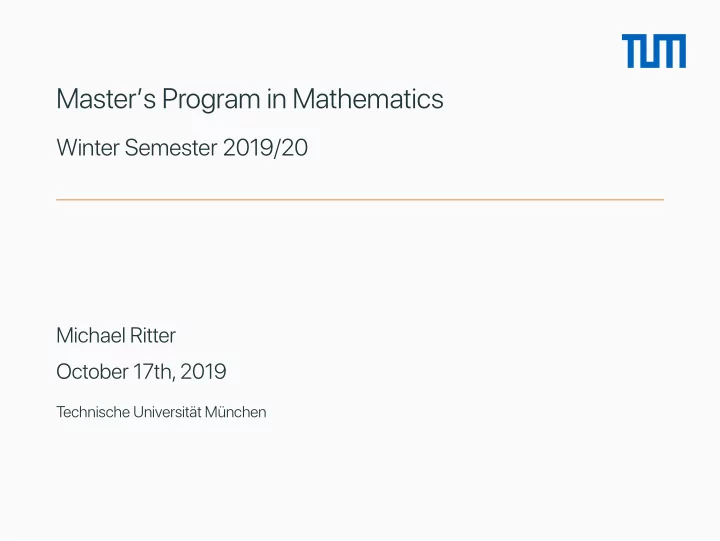

Master’s Program in Mathematics Winter Semester 2019/20 Michael Ritter October 17th, 2019 T echnische Universität München
Overview 5. T . 7 Comparison: Current vs New 6. Modules from other Universities: Recognition Requirements & Module Catalog 1. 4. Specialization vs Diversified Study 3. General Structure 2. What’s New? ransition
What’s New?
What’s New? ▶ two options: ▶ area of specialization ▶ diversified study ▶ restructured module catalog ▶ catalog cleanup & update
Program Structure
General Structure math modules minor (opt) seminar, internship, interdiscip. modules thesis
General Structure A3 D C B1 A6 A5 A4 A2 math modules A1 thesis modules interdiscip. seminar, internship, (opt) minor E
General Requirements math modules ≥ 50 minor modules ≤ 27 seminar 3 internship 6 interdisciplinary modules 4 30 master’s thesis 77 13 120
Specialization vs. Diversified Study Option 2: Diversified Study ▶ obtain ≥ 50 total math credits ▶ admissible sections: A1-A6, B1, C ▶ obtain ≥ 9 credits each in at least 4 sections ▶ optional minor Option 1: Choose Area of Specialization ▶ obtain ≥ 50 total math credits ▶ obtain ≥ 30 credits from chosen section (A1-A6) ▶ will show up on transcript ▶ optional minor
Specialization vs. Diversified Study Option 2: Diversified Study ▶ obtain ≥ 50 total math credits ▶ admissible sections: A1-A6, B1, C ▶ obtain ≥ 9 credits each in at least 4 sections ▶ optional minor Option 1: Choose Area of Specialization ▶ obtain ≥ 50 total math credits ▶ obtain ≥ 30 credits from chosen section (A1-A6) ▶ will show up on transcript ▶ optional minor
Module Catalog
Mathematical Modules A1 Analysis and PDE A2 Algebra and Geometry A3 Probability Theory A4 Numerical Analysis and Scientific Computing A5 Optimization A6 Biomathematics and Biostatistics B1 Mathematics Modules in other Fields areas of specialization
Module Catalog – Math Modules A1 Analysis and PDE ▶ Functional Analysis ▶ Partial Differential Equations ▶ Dynamical Systems ▶ Fourier Analysis ▶ Differential Forms ▶ …
Module Catalog – Math Modules A2 Algebra and Geometry ▶ Algebra 2 ▶ Algebraic Geometry ▶ Projective Geometry ▶ Differential Geometry ▶ T opology ▶ …
Module Catalog – Math Modules A3 Probability Theory ▶ Probability Theory ▶ Stochastic Analysis ▶ Markov Processes ▶ Probability on Graphs ▶ Probabilistic T echniques and Algorithms in Data Analysis ▶ …
Module Catalog – Math Modules A4 Numerical Analysis and Scientific Computing ▶ Numerical Methods for PDE ▶ Meshfree Methods ▶ Numerics of Dynamical Systems ▶ Computational Inverse Problems ▶ Optimal Control of ODE ▶ …
Module Catalog – Math Modules A5 Optimization ▶ Linear and Convex Optimization ▶ Discrete Optimization ▶ Nonlinear Optimization Advanced ▶ Polyhedral Combinatorics ▶ Nonsmooth Optimization ▶ …
Module Catalog – Math Modules ▶ ▶ Case Studies Life Science Mathematics ▶ Computational Statistics ▶ Applied Regression Advanced Mathematical Biology”) A6 (formerly “ Applications of Mathematical Biology ▶ Mathematical Models in Biology ▶ Biomathematics and Biostatistics …
Module Catalog – Math Modules B1 Mathematics Modules in other Fields ▶ Generalized Linear Models ▶ Discrete Time Finance ▶ Investment Strategies ▶ Fixed Income Markets ▶ …
Module Catalog – Minor Modules C Mathematical Theories in other Disciplines C1 Informatics C2 Physics C3 Economics C4 Chemistry C5 Life Sciences C6 Other Sciences
Going Abroad: Recognition
Recognition of Modules 1:1 Recognition ▶ (almost) identical to TUM module ▶ counts as TUM modules ▶ credits: minimum of the two modules Mathematics Modules from other Universities (B2) ▶ master level course ▶ mathematical content ▶ recognized in math program
Recognition of Modules 1:1 Recognition ▶ (almost) identical to TUM module ▶ counts as TUM modules ▶ credits: minimum of the two modules Mathematics Modules from other Universities (B2) ▶ master level course ▶ mathematical content ▶ recognized in math program
Recognition of Modules Mathematical Theories in other Disciplines from other Universities (C7) ▶ master level course ▶ non-mathematical course ▶ application of mathematical theories Recognition into Area of Specialization ▶ master level course ▶ suitable for the chosen field ▶ counts towards specialization credits
Recognition of Modules Mathematical Theories in other Disciplines from other Universities (C7) ▶ master level course ▶ non-mathematical course ▶ application of mathematical theories Recognition into Area of Specialization ▶ master level course ▶ suitable for the chosen field ▶ counts towards specialization credits
Comparison: What has Changed?
Prominent Changes ▶ optional specialization ▶ restructured module catalog ▶ diversified study: cover 4 out of 8 sections (formerly 3 out of 5 ) ▶ new minor “Life Sciences” ▶ no explicit limits for module recognitions
Transition
Applicability of Examination Regulations ▶ from winter 2019/20 � new regulations ▶ until summer 2019 � old regulations ▶ change into new regulations: upon request � mail to master@ma.tum.de ▶ no changing back into old regulations
Questions? Frank Himstedt Academic Advisor M. Sc. Mathematics himstedt@ma.tum.de Michael Ritter General Examination Regulations master@ma.tum.de Michael Kaplan Admissions mscapp@ma.tum.de
Recommend
More recommend